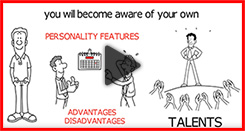Our Services
Elements
- Career Counseling Process
- Workshops and Coaching
- Assessment Center
- Self Marketing and CV Generation
- Change Management
Contact Details
- building # 27 Abdulla Ibn Taher St., extension of Abu Daood El Zahery St., Makram Ebied, Near El Arkam Mosque, Nasr City, Cairo
- +2 - 012 - 80076959
+2- 012 - 22710836 - info@CareerCounselingEgypt.com register@CareerCounselingEgypt.com
Why Career Counseling?

Objectives for Career counseling Activities
We recommend following our steps if you want to discover about yourself...- Take the Psychometric Assessment guided by our experts .
- Find Your Gifts and Talents through a written report & feedback interview.
- Know your Personal Area to Develop.
- Confirm Your Occupational Interests using the "RIASEC Code" guided by our experts .
- Review occupations that match your talents, gifts & interests through a written report & feedback interview.
- Review the Occupational Job Descriptions including (scope, tasks, knowledge, interests) guided by our experts .
- Affirm your career or get ready to prepare for a different career .
- Take actions to prepare acquiring the needed Occupational Competencies required for the chosen occupation guided by our experts .
- Update your resume to reflect the skills you excel at.
- Search Targeted occupations in the employment market.
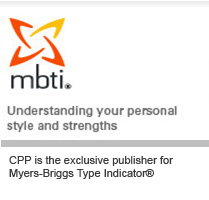
Psychometric Assessment Instrument
Through our team of certified MBTI practitioners, we are strong advocates of the use of MBTI psychometric assessments for both individuals and organizations.
We adhere to a strict code of ethics in the administration,
analysis and feedback of all psychometrics, ensuring we
match the correct instruments and assessments to the individual
needs of each client.
About MBTI Instrument
- An indicator—not a test
- Looks only at normal behavior
- Forced-choice questions
- Takes about 20–40 minutes to complete
- No right or wrong answers—answer as you see fit
- Your results are confidential
- There are no good or bad types—all types have some natural strength and some possible pitfalls or blind spots.
- The instrument gives practical results you can use:
- In teamwork
- In communication
- In decision making
Uses of the MBTI Instrument
After more than fifty years of research and development, the MBTI® is the most widely used instrument for understanding normal personality differences. It is used in:- Self-understanding and development
- Career exploration, development, and counseling
- Relationship and family counseling
- Organization development
- Team building
- Improving problem solving
- Management training
- Leadership development
- Education and curriculum development
- Diversity and multicultural training
Where the MBTI® Tool Is Used

- Most Fortune 100 companies
- More than 2 million people worldwide each year
- Translated into 30+ languages
- Used in 70+ different countries including the following:
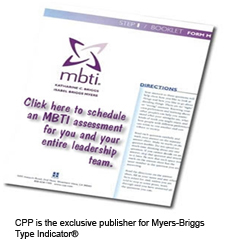
Step One – Do the Psychometric Assessment
The MBTI is the most well-known personality model in the world.
Personality typing as defined by Myers and Briggs assumes that much of our personality can be defined by dividing it into four independent preference areas or scalesWithin each scale we have a preference for one of two opposites that define the scale.
Following are the preferences for each of the four scales:
1. Energizing - How a person is energized:
- Extroversion (E) - Preference for drawing energy from the outside world of people, activities or things.
- Introversion (I) - Preference for drawing energy from one's internal world of ideas, emotions, or impressions.
2. Attending - What a person pays attention to:
- Sensing (S) - Preference for using the senses to notice what is real.
- Intuition (N) - Preference for using the imagination to envision what is possible - to look beyond the five senses. Jung calls this "unconscious perceiving".
3. Deciding - How a person decides:
- Thinking (T) - Preference for organizing and structuring information to decide in a logical, objective way.
- Feeling (F) - Preference for organizing and structuring information to decide in a personal, value-oriented way.
4. Living - Life style a person prefers:
- Judgment (J) - Preference for living a planned and organized life.
- Perception (P) - Preference for living a spontaneous and flexible life.
After completing your Questionnaire, you will be able to Choose and Confirm Your "Best Fit Type" for yourself
The 16 Personality Types:


Download a Sample report- Personality Type Report
Step Two – Discover your Gifts and Talents
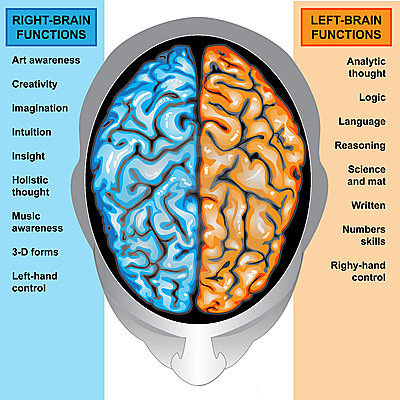
Gifts and Talents
- Everyone has things that come easily to them.
- Things they do that are almost effortless yet create amazing results.
- They are one of the things that make us unique and special on this planet.
- The tasks you excel at reveal your natural gifts and talents. They describe what you are naturally great at doing.
- If you develop them and put them to work, you have the beginnings of a great career or business.
- Your confidence goes up because you start to realize how gifted and talented you really are.
- You begin to recognize and take advantage of more opportunities to excel when you realize "Hey, I can do that!" .
- You start to notice the gifts and talents you already use and start thinking about how to take them to the next level of development.
- Over time, as more ideas keep surfacing, your ideas about who you are and what you can excel at keep evolving.
- Our talents mostly go unrecognized, untapped and undeveloped.

Download a Sample report- Mental Function Report
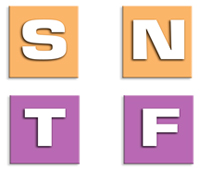
Step Three – Know your Development Recommendations
The idea is to know exactly
1. What are the things that I am good at? ,to recognize and develop (Used as an Edge)
2. What are the things that I am not good at? ,
to recognize and develop (Used to minimize the weaknesses)
Know about your Mental Functions
The middle two letters of the Personality Type Code refer to the "Mental Functions".- "Dominant" function(#1); Most important or influential function
- "Auxiliary" function(#2); Second most important
- "Tertiary" function (#3); Third in the hierarchy and is the polar opposite of whatever function is the Auxiliary.
- "Inferior" function (#4); It is the mental process with the least conscious awareness and typically the least developed of the four functions.
Hierarchy of Preferences by Type
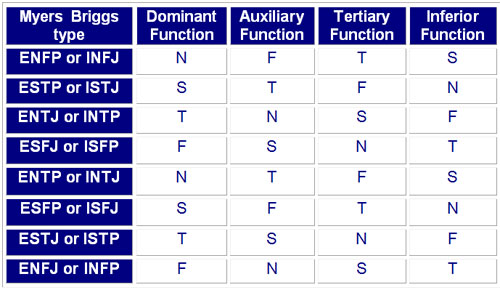

Download a Sample report- Development Report
Step Four – Discover your Occupational Interests
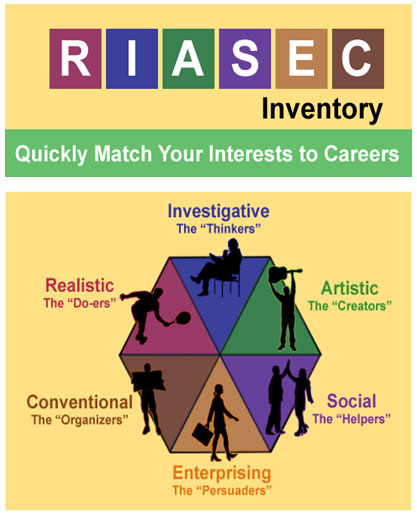
RIASEC Code of Occupational Interest developed by John Holland
RIASEC Code of Occupational Interests
The Holland Codes represents a set of personality types described in a theory of careers and vocational choice formulated by psychologist John L. HollandHis model has been adopted by the U.S. Department of Labor for categorizing jobs relative to interests.
any person could be described as having interests associated with each of the six types in a descending order of preference.
Most dominant codes are used for vocational guidance.
The six personality and work environment types described by Holland are as follows:
- Realistic - practical, physical, hands-on, tool-oriented
- Investigative - analytical, intellectual, scientific, explorative
- Artistic - creative, original, independent, chaotic
- Social - cooperative, supporting, helping, healing/nurturing
- Enterprising - competitive environments, leadership, persuading
- Conventional - detail-oriented, organizing, clerical

Download a Sample report- Occupational Interest Report
Step Five – Career Management Process
Career Management
- Is the final Step of the Career Counseling Process
- That step where we match the Personal Interests of the person with the Occupational Interests that best fit for his/her talents
The Benefits of such process:
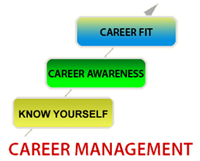
- Identify the best occupational interests (RIASEC Code) with respect to the Personality profile (MBTI Profile) interests.
- Know exactly what are the occupations that will be very promising to the person if succeeded to enter such profession .
- Utilize The Occupational Information Network (O*NET).
- Know exactly what are the Occupational specifications and job description for these most suitable identified occupations.
- Help the person prepare to obtain the needed knowledge and Skills necessary to perform the essential functions of these selected most suitable occupations .

Download a Sample report- Smart Job Match Report

